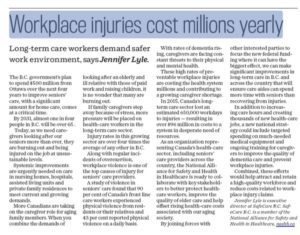The article below was featured in the March 23, 2017 issue of The Vancouver Sun.
By Jennifer Lyle

The Government of British Columbia’s announcement of a plan to spend $500 million over the next four years to improve seniors’ care along with the significant investment in B.C.’s home care included in our new health funding agreement with the federal government come at a critical time for the province’s healthcare system.
By 2031, almost one in four people in B.C. will be over the age of 65. Across the country, an aging population is projected to put unprecedented demand on our already overburdened seniors’ care sector.
Yet, without a coordinated national strategy to address critical health human resources challenges, these investments could fail to have the desired impact where it would benefit aging patients the most – on the frontline of elder care.
Today, as we need the caregivers looking after our seniors more than ever, they are burning out and being injured on the job at unsustainable levels.
Systemic improvements are urgently needed on the frontline of care in nursing homes, hospitals, assisted living units and private family residences in order to meet current and growing demands.
Canadians are increasingly taking on the caregiver role for our aging family members. When you combine the demands of looking after an elderly and ill relative with those of paid work and raising children, it is no wonder that many of us are burning out. In Ontario, the number of unpaid family caregivers who have had to stop providing care due to stress has more than doubled in recent years.
If family caregivers continue to step away from the role because of distress, more pressure will be placed on healthcare workers in the long-term care sector.
Injury rates in this growing sector are over four times the average of any other in B.C. Across Canada, hundreds of care aides and nurses are being injured each day.
Along with regular incidents of overexertion, workplace violence is one of the top causes of injury for seniors’ care providers.

A study of violence in seniors’ care found that 90 per cent of Canadian frontline care workers experienced physical violence from residents or their relatives and 43 per cent reported physical violence on a daily basis.
With rates of dementia rising, caregivers are facing constant threats to their mobility, physical and mental health.
In addition to having a negative impact on the life of healthcare workers and the quality of seniors’ care, these high rates of preventable workplace injuries are costing the health system millions and contributing to a growing caregiver shortage.
In 2015, Canada’s long-term care sector lost an estimated 650,000 workdays due to injuries – resulting in over $96 million in costs to a system in desperate need of resources.
As an organization representing Canada’s healthcare sector, including seniors’ care providers across the country, the National Alliance for Safety and Health in Healthcare is ready to collaborate with key stakeholders to better protect healthcare workers, improve the quality of elder care and help offset rising healthcare costs associated with our aging society.
By joining forces with key stakeholders to focus new funding where it can have the biggest impact in the sector, we can make significant improvements in long-term care in B.C. and across the country that will ensure care aides can spend more time with seniors than recovering from injuries.
In addition to increasing care hours and creating thousands of new healthcare jobs, a new national strategy could include targeted investments in much-needed medical equipment and ongoing training for caregivers to improve the quality of dementia care and prevent workplace injuries.
Combined, these efforts would help attract and retain a high-quality workforce and reduce costs related to workplace injury claims.
It’s time that we make supporting our caregivers a priority so they can continue to fulfill their vital role in our society and our healthcare system.
SafeCare BC is a member of the National Alliance for Safety and Health in Healthcare.
This Op-ed has been published in The Vancouver Sun on March 23, 2017. View it here.




